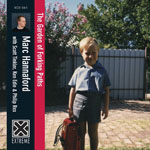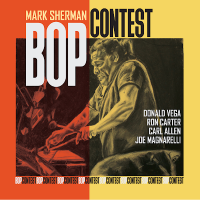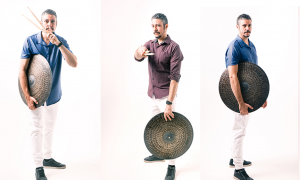Home » Jazz Articles » Interview » Lucian Ban: Transylvania's Rhapsody in Blue
Lucian Ban: Transylvania's Rhapsody in Blue
Raised in the tiny farming village of Teaca, situated in the center of Transylvania, Ban grew up listening to folk songs performed at weddings, birthdays, holidays and other celebrations. The instrumental and choral folk music of Ban's youth attracted Béla Bartok, a century ago, to this pastoral region, which encompasses a rich cornucopia of Hungarian, Austrian and Romanian culture.
At age seven, Ban moved 100 miles southwest of Teaca to the Transylvanian city of Cluj, where he started classical piano and composition training. The spirit of his native folk music, however, would eventually lead Ban to embrace the improvisational freedom of jazz, blues and rock during a time when freedom, especially when associated with the West, posed a political problem for musicians living behind the Iron Curtain. Ban credits Thelonious Monk, Randy Weston, and Bud Powell as early jazz influences. Impressions of Ellington, Paul Bley, Keith Jarrett, and Abdullah Ibrahim soon followed.
After studying composition at the Bucharest Music Academy from 1992 to 1995, Ban formed his first stable quartet, Jazz Unit. This band afforded him an opportunity to write, arrange and record two discs, including a live release at Green Hours, the capital's premier jazz club. New compositions, new recordings and a willingness to further his jazz education prompted a move to NYC in 1999 to study at the New School. A 2002 duet with baritone saxophonist Alex Harding produced the well-received disc Somethin' Holy (CIMP Records) and marked the pianist's American recording debut.
Since then, Ban's collaborative thumbprint has been wide-ranging, including membership in the Tuba Project quintet featuring Bob Stewart, Alex Harding's Blutopia band, Hieroglyphics with drummer Barry Altschul, and the Asymmetry quartet with alto saxophonist Jorge Sylvester. Yet, if a common characteristic of Ban's music exists, it may be the blending of modern jazz improvisation with traditional Transylvanian folk rhythms and melodies. It's a sound he brings home twice a year, touring Romania with a stable of American jazz compatriots like soprano saxophonist Sam Newsome who, with Ban, recently co-composed, arranged and performed a jazz suite based on Romanian folk music.
"If music is good, people will relate to it all over the world, says Ban. Be they in Teaca or Cluj or New York City.
All About Jazz: You began playing music by studying the classical repertoire. How did improvisation enter your musical education?
Lucian Ban: By discovering jazz through my first mentor, Gyorgy Joldt, a great pianist and jazz connoisseur. Randy Weston, Bud Powell, Monk were my first encounters with jazz. Then Keith Jarrett, Paul Bley, Abdullah Ibrahim and Duke Ellington. Improvisation was a totally different approach to music. I knew about European music but this was something else!
AAJ: With the communists in power in Romania until 1989, was it difficult to find jazz recordings and other jazz musicians to play with at the beginning of your career?
LB: Yes, very, but I was lucky to have a mentor who had an incredible jazz collection, 2000 LPs, some of them signed. It was a gold mine, and for two-to-three years I was at his place everyday sucking up every album and musician I heard. These were special years of accumulation and learning. There were very few jazz musicians in the whole country, no scene at all, in fact. It was something subversive, and the few jazz musicians that did exist had the status of "political dissidents" because of the very art form they were practicing.
AAJ: Describe your experience playing in Jazz Unit, your first band. What did you take away from that group?
LB: I took a lot from it, learning to play for, write for, and lead a working combo. I also learned a great lesson: to write for the specific players in the band and not for the instrumentation. I'm proud to say that during the time that Jazz Unit was active we actually became one of the best jazz combos in Romania.
AAJ: Alex Harding was and continues to be one of your primary musical collaborators. How did you meet?
LB: Alex and I played together from first moment I got to New York, and I've learned a great deal from him as a musician, friend and somebody with more experience on the scene. He's introduced and recommended me to many of the great and established players in the city.
AAJ: For the past five years, you and Alex have worked together on a series of recording projects: The Tuba Project (CIMP, 2006), The Calling (Jazzaway, 2005), Premonition (CIMP, 2003), and Somethin' Holy (CIMP, 2002). How did these originate?
LB: Each of these groups originated with our desire to play original music with specific players and instruments. The Tuba Project, for example, features tuba instead of bass. What's more, it showcases one of the best tuba players around, Mr. Bob Stewart.
AAJ: You also lead Asymmetry, a quartet you recorded with Jorge Sylvester on alto, Brad Jones on bass, and Derrek Phillip on drums. Describe the music of Asymmetry and the chemistry of the players.
LB: Jorge is one of the most original voices on alto in the last decade. The rhythm section is one of the best and most versatile in New York, I think. They played collectively with everybody from Elvin Jones, to Muhal Richard Abrams, Greg Osby, Vijay Yere, etc. So it didn't matter what I would write, these cats could play everything. And actually the writing was in a sense minimal because the musicians could make so much more out of the notes on the paper. Great band, and our album, Playground (Jazzaway, 2006), represents one the best things I've done to date.
AAJ: Is this your working group?
LB: It was a working group until [drummer] Derrek Phillips moved to Nashville. But we still play some gigs and we're thinking of a European tour.
AAJ: I heard you at the Cornelia Street Cafe in April [2007]. Sam Newsome was on sax that night. He's got a really original voice on soprano and tenor, commanding the room with his playing. How did you guys get together?
LB: Sam is an old friend and collaborator. It's always a pleasure and honor to work with him. He's a master soprano player with a unique sound and a high level of participation in the group. I think we met through Alex Harding, and I enjoyed playing with him from the first note. He started as a tenor player with Donald Byrd and Terence Blanchard, quickly acquiring international notoriety. Then he made a 180-degree switch to playing soprano sax exclusively, and he's now considered one of the premier soprano sax players in the world.
We toured Romania twice, actually, first in 2003 with his group Global Unity, featuring Derrek Phillips on drums, Carlo DeRosa on bass, me on piano and a great tenor player from Romania, Christian Soleanu. Then we toured for the second time this spring with a grant from Meet the Composer. Sam and I composed and arranged a jazz suite based on Romanian folk music. We toured Romania in March and April this year, performed the suite and conducted workshops at several NY clubs and universities. The Romanian Cultural Center is planning to record our group for a special release and European tour in early 2008.
AAJ: What have you been working on recently?
LB: I recently did a couple of concerts with Tuba Project in Romania, working with Alex Harding and a young electronica wizard from Bucharest for a jazz-otronica album. In October I did a ten-day tour in Romania with the great singer Sandra Weigl, playing German cabaret and Romanian gypsy music done in a downtown jazz manner. That band featured Gerald Cleaver on drums, Sean Conly on bass, Lilly Henly from Boston on violin, Alex Harding on bass clarinet and baritone-sax, and myself on piano and musical director.
AAJ: What is the next project that you hope to record?
LB: I definitely want to record a project called Elevation, with Abraham Burton on tenor sax, Jeff Carney on bass, and Nasheet Waits on drums. Last May I did a week long gig at Dizzy's with Abraham as guest and it was astounding.
AAJ: Can you compare your audiences in America with those in Romania?
LB: If music is good people will relate to it all over the world. With this said I will say that American audiences are more familiar with jazz in general. They can relate faster without necessarily being real connoisseurs. On the other hand, the Romanian audiences are still very hungry for creative music, and they appreciate it as such. There are so many great musicians in NYC, famous or not, maybe the audiences take it for granted.
AAJ: As a musician are you interested in why people listen to the music they listen to?
LB: Yes, tell me what records you have in your collection and I'll tell you who you are.
Selected Discography
Lucian Ban/Alex Harding Tuba Project, Tuba Project (CIMP, 2006)Lucian Ban & Asymmetry, Playground (Jazzaway, 2005)
Alex Harding & Blutopia, The Calling (Jazzaway, 2005)
Lucian Ban/Alex Harding Quintet, Premonition (CIMP, 2002)
Lucian Ban/Alex Harding Duet, Somethin' Holy (CIMP, 2002)
Jazz Unit Septet, From Now On (Green Records, 1999)
Jazz Unit Septet, Changes—Live at Green Hours (Green Records, 1997)
Tags
PREVIOUS / NEXT
Lucian Ban Concerts
Support All About Jazz
 All About Jazz has been a pillar of jazz since 1995, championing it as an art form and, more importantly, supporting the musicians who make it. Our enduring commitment has made "AAJ" one of the most culturally important websites of its kind, read by hundreds of thousands of fans, musicians and industry figures every month.
All About Jazz has been a pillar of jazz since 1995, championing it as an art form and, more importantly, supporting the musicians who make it. Our enduring commitment has made "AAJ" one of the most culturally important websites of its kind, read by hundreds of thousands of fans, musicians and industry figures every month.

























